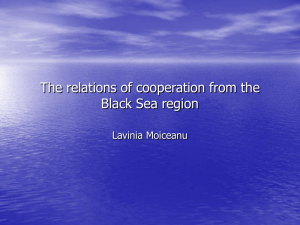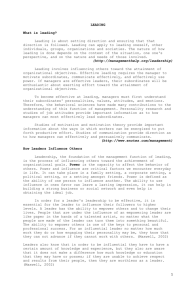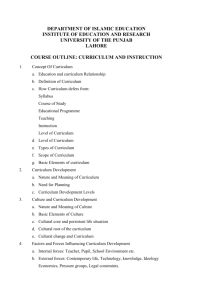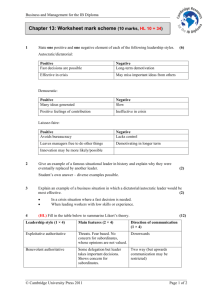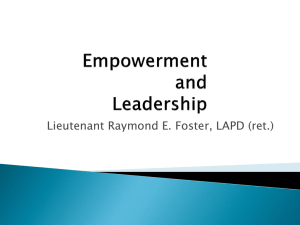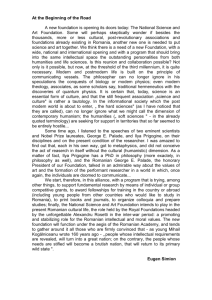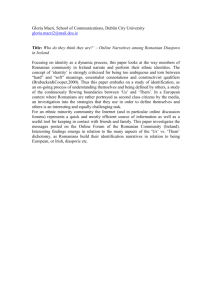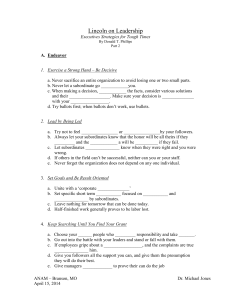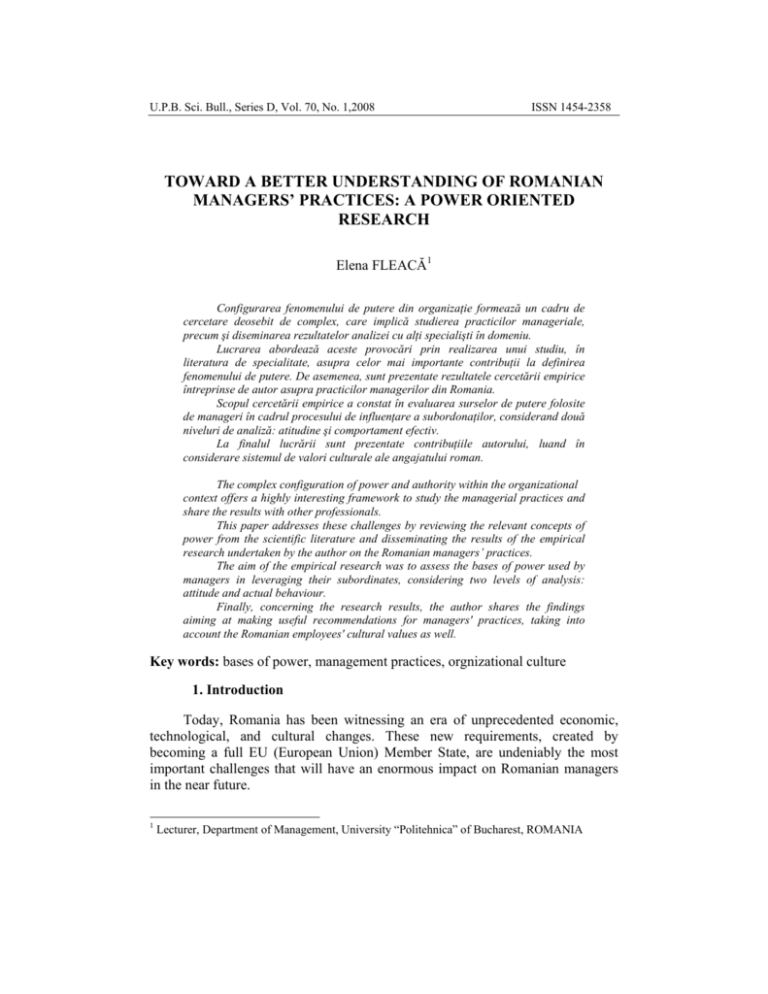
U.P.B. Sci. Bull., Series D, Vol. 70, No. 1,2008
ISSN 1454-2358
TOWARD A BETTER UNDERSTANDING OF ROMANIAN
MANAGERS’ PRACTICES: A POWER ORIENTED
RESEARCH
Elena FLEACĂ1
Configurarea fenomenului de putere din organizaţie formează un cadru de
cercetare deosebit de complex, care implică studierea practicilor manageriale,
precum şi diseminarea rezultatelor analizei cu alţi specialişti în domeniu.
Lucrarea abordează aceste provocări prin realizarea unui studiu, în
literatura de specialitate, asupra celor mai importante contribuţii la definirea
fenomenului de putere. De asemenea, sunt prezentate rezultatele cercetării empirice
întreprinse de autor asupra practicilor managerilor din Romania.
Scopul cercetării empirice a constat în evaluarea surselor de putere folosite
de manageri în cadrul procesului de influenţare a subordonaţilor, considerand două
niveluri de analiză: atitudine şi comportament efectiv.
La finalul lucrării sunt prezentate contribuţiile autorului, luand în
considerare sistemul de valori culturale ale angajatului roman.
The complex configuration of power and authority within the organizational
context offers a highly interesting framework to study the managerial practices and
share the results with other professionals.
This paper addresses these challenges by reviewing the relevant concepts of
power from the scientific literature and disseminating the results of the empirical
research undertaken by the author on the Romanian managers’ practices.
The aim of the empirical research was to assess the bases of power used by
managers in leveraging their subordinates, considering two levels of analysis:
attitude and actual behaviour.
Finally, concerning the research results, the author shares the findings
aiming at making useful recommendations for managers' practices, taking into
account the Romanian employees' cultural values as well.
Key words: bases of power, management practices, orgnizational culture
1. Introduction
Today, Romania has been witnessing an era of unprecedented economic,
technological, and cultural changes. These new requirements, created by
becoming a full EU (European Union) Member State, are undeniably the most
important challenges that will have an enormous impact on Romanian managers
in the near future.
1
Lecturer, Department of Management, University “Politehnica” of Bucharest, ROMANIA
118
Elena Fleacă
The new context has stressed the need of management professionals for an
effective utilization of resources from the European Union. Additionally,
Romanian managers have to be skilled in acquiring and exercising social power to
marshal the human, informational, and material resources to get things done.
Improving the effectiveness in leveraging the subordinates can be done by
reflecting on the bases of power managers have and the types of power that they
may use. As consequence, the paper addresses the growing need of studying the
Romanian managers’ exercise of power, considering national culture values as the
major explanatory variable.
2. Theoretical background
The concept of power has been paid attention to a lot of researchers and
scholars. According to the scientific literature, the meaning of power has been
defined as the capacity to produce effect on others or the potential to influence
others [1]. Nevertheless, the reality shows that managers who can reward or
punish subordinates may have a greater capacity to influence subordinates
comparing with those managers who cannot use rewards and punishments.
Similarly, subordinate or situational characteristics may diminish a manager's
potential to influence subordinates, as when the latter belong to a strong, active
union. Because of this, merely having the capacity to exert influence can often
bring about intended effects, even though the manager may not take any action to
influence his subordinates. Thus, further developments in the field have
distinguished the need to better define the concept of power because of its
complexity and pervasive characteristic.
As scientific literature reveals, distinguished experts in social science have
contended that power can be defined within two characteristics: static and
dynamic [2]. The first characteristic – known as power bases or power - is
pertained to capacity to influence or to induce change on someone else, including
changing in attitudes, goals, needs, and values. The second characteristic – known
as influence tactics or influence - is referring to one person's actual behavior
designed to change another person’s attitudes, values, or behaviors [3].
Valuable researches in this matter have distinguished nine generic influence
tactics such as rational persuasion, inspirational appeal, consultation, ingratiation,
personal appeals, exchange, coalition, pressure, and legitimization [4].
Afterwards, other authors have structured the first five influence tactics in soft
tactics because they are friendly and not as coercive as the last four tactics.
Exchange, coalition, pressure, and legitimization were called hard tactics because
they involve more overt pressure [5].
Researches on the power sources have their roots in the taxonomy of social
power brought by French and Raven [6]. They proposed that power arises from
five different bases: reward power, coercive power, legitimate power, expert
Toward a better understanding of romanian managers’ practices: a power –oriented research
119
power, and referent power. Reward power involves the managers' potential to
influence their subordinates due to their control over desired resources. This can
include obtaining compliance by promising or granting bonuses, promotions, and
rewards. Coercive power, the opposite side of reward power, is the managers'
potential to influence subordinates through the administration of negative
sanctions or the removal of positive events. In the other words, it is the ability to
control subordinates through the fear of punishment or the loss of valued
outcomes. Legitimate power is anchored to manager's organizational role or
official authority. Therefore, legitimate power arises because the manager has
been assigned a particular role in an organization, having this authority only as
long as he or she occupies that position and operates within the proper bounds of
that role. As these power bases are rested on the manager's position in an
organization, they have been lumped together into one category named position
powers or organizational power [7].
Expert power is the managers' potential to influence subordinates through
their relative expertise in particular areas. Expert power is a function of the
amount of knowledge one possesses relative to the rest of the members of the
group. Consequently, it is possible for the subordinates to have considerably more
expert power than managers in certain situations. Latest findings have suggested
that expert power is not confined to higher organizational levels. Some of the
most specialized knowledge in an organization can be possessed by the lowerlevel employees [8].
Referent power, called charisma, refers to the managers' potential to
influence subordinates due to the strength of the relationship between the manager
and the subordinates. One way to counteract the problems stemming from a lack
of expertise is to build strong interpersonal ties with subordinates. As researchers
have noted, referent power comes into play when manager's personality becomes
the reason for compliance [9]. Because the access to expert power and referent
power does not depend solely on the organization, these power bases have been
lumped together into one category labeled personal powers. Furthermore,
personal powers are especially valuable because they do not depend directly or
only on the actions of others, staying with the individual regardless of the position
or the organization.
Another interesting insight has been brought by the well-known scientist
McClelland who has explained the acquisition and exercise of power. He
concluded that one of the basic human needs is the need for power and it is
positively related to various leadership effectiveness criteria [10].
Further contributions have pointed out that although some need for power is
necessary for leadership potential, successful managers also have the ability to
inhibit their manifestation of this need. Managers who are relatively uninhibited in
their need for power will act like a dictator, using power impulsively,
120
Elena Fleacă
manipulating or controlling others. Managers with a high need for power but low
activity inhibition may be successful in the short term, but the organization and
their subordinates may pay high costs for this success [11].
Interestingly, recent researches have paid attention to the ethical face of
power in the attempt to explain why power has a negative connotation for many
people. Thus, researchers have drawn a distinction between socialized power and
personalized power. Socialized power is the power directed at helping others to
really have an impact on the community. It often involves an empowering, rather
than an autocratic style of management. At the opposite side there is the dark face
of power named personalized power. This type of power is directed only at
helping oneself making the personal needs a central point of interest [12].
Other scholars have proposed a systemic approach of power: inputs,
transformation process, and outputs. During the transformation process, managers
use specific tools – power bases -, and techniques – interpersonal influence tactics
– to influence their subordinates [13].
Finally, drawing knowledge from the scientific literature, the author has
chosen to analyze practices of exercising power in the light of Romanian
employees' cultural values. Although by no means exhaustive, this research
assesses the five bases of power used by Romanian managers in leveraging their
subordinates, considering two levels: attitude and actual behaviour.
3. Research methodology
Becoming an effective manager requires to be able to exercise power toward
modifying subordinates' attitudes and behaviours in the desired direction. Because
power, influence, and power bases play such important roles in the managing
process, this paper addresses three key objectives:
O1. Assessing the managers’ attitude related to power bases
O2. Assessing the managers’ behavior concerning the use of specific power bases
O3. Studying the correlation between social variables of managers and the use of
power bases
Fulfilling the third research objective has required development of the
following statistical hypotheses:
H0: The respondents’ age does not influence significantly managers' power bases.
H1: The respondents’ age influences significantly managers' power bases.
H0: The respondents’ gender does not influence significantly managers’ power
bases.
H1: The respondents’ gender influences significantly managers' power bases.
The research process has involved structuring the variables in two
categories: independent and dependent variables. The independent variables
encompassed social characteristics of respondents- age, gender, educational
background etc. -, and were measured by nominal scales. The dependent variables
Toward a better understanding of romanian managers’ practices: a power –oriented research
121
of the research have required designing multiple-item scales due to the abstract
nature of the characteristic that had to be measured.
The research was questionnaire-based. The questionnaire had an adequate
pattern, starting with questions to evaluate the managers’ attitude and finishing
with questions for respondents’ characteristics. Dichotomy and open questions
were used as well. Control questions have been used as respondent filter, too. The
questionnaire was distributed to 155 managers, and only 68 respondents have
filled the questionnaire.
The questionnaire has included demographic information such as gender,
age, work experience, educational background, and situational information such
as type of leadership position, and type of department and its size.
Gender structure was rather balanced (63.6% women and 36.4% men).
Respondents’ age was mostly up to 35 years (81.8%); 15.91% were of 35-45; and
only 2.29% were older than 45 years.
The work experience in the same position was spread mostly between 1 to 5
years (40.91%); 38.64% of respondents had less than one year work experience
and 20.45% had more than 5 years experience in same position.
The respondents had different backgrounds such as: 69.09% technical,
21.82% economical, and 9.09% have humanistic background.
The structure of the sample in terms of management levels was as follows:
28.9% of respondents from strategic level, 48.9% from functional level, and
22.2% came from operational level.
The respondents come from different departments such as: 38.64% form
Commercial department, 15.9% from IT department, 13.64% from Production
department, 13.64% from Human Resources department, 11.36% from Research
& Development department and 6.82% from Finance department.
From department size point of view, 61.36% of respondents have worked in
small departments with less than 10 co-workers, 25.00% in medium-size
departments and 13.64% have worked in large departments with more than 30 coworkers. Statistical procedures were applied for data analysis, aiming to match the
research objectives. The central tendency was calculated taking into account the
way in which the variables were measured (tables 1 and 2). The correlation
coefficient - Goodness of Fit - χ2 - was calculated for testing statistical hypotheses.
Table 1
The managers' attitude toward power bases
Nr.
Power bases
Attitude
Arithmetic mean
1
Expert power
4,57
2
Referent power
3,90
3
Legitimate power
3,77
4
Reward power
2,73
5
Coercive power
1,69
122
Elena Fleacă
Table 2
The managers' actual behaviour related to power bases
Nr.
Power bases
Actual behaviour
Arithmetic mean
1
Expert power
4.29
2
Reward power
4.09
3
Referent power
3.54
4
Coercive power
3.11
5
Legitimate power
2.87
4. Key findings
The results of data analysis reveal a gap between the managers' attitude
and their actual behaviour. According to specialists in social science, an attitude is
a learned predisposition to respond in a consistently favourable or unfavourable
manner with respect to a given object [14]. Moreover, attitude theory suggests that
the ultimate behaviour of a person is a function of three attitudinal components:
affective component, cognitive component, and behavioural component. It is
worth to be noted here that behavioural component refers to how one intends or
expects to act toward someone or something [15].
Considering the research results (table 1), Romanian managers are more
likely to exercise their influence through expert power (4.57) - stemmed from
their knowledge, reputation, and status-, followed by referent power (3.90) and
legitimate power (3, 77). As researches have found there are three power bases
that are viewed positively: legitimate, expert, and referent. In summary, expert
and referent power appear to get the best combination of results and favourable
reactions from lower-level employees [16]. At the first glance, Romanian
managers seem to be well prepared practitioners with an adequate education in
management field. But when it comes to put in practice what they have learned
the situation has been considerably changed. Assessing the current practices of
Romanian managers (table 2) reveals that they act using expert power (4,29)
followed by reward power (4,09).
These results yield important clues about the management practices within
our society. Obviously, the respondents are confronting with a complex
phenomenon named cognitive dissonance. As specialists stated, cognitive
dissonance represents the psychological discomfort a person experience when his
attitudes or beliefs are incompatible with his ultimate behaviour [17]. For
example, our managers tend to use expert power, referent power and legitimate
power in managing their subordinates, but they are contradicted by reality that
requires using reward power. In our context, reward power is consisted of positive
evaluation of subordinates’ performance, and also wages increases, promotion and
extra bonuses.
Toward a better understanding of romanian managers’ practices: a power –oriented research
123
On the other hand, the extent to which managers use their legitimate power
is significantly diminished than the intended level (2,87 versus 3,77). At the
opposite side, there is coercive power which is use more extensively than the
declarative intentions (1, 69 versus 3, 11).
Validation of the first research hypothesis ( χ c2 = 0.736 ) points to the
respondents’ age does not influence significantly managers' power bases. The
finding could be explained by the relatively homogeneity of the sample, being
mostly represented by young people up to 35 years (81.8%). Regardless of this,
previous empirical researches undertaken by the authors have ascertained the
managers working behaviour is significantly influenced by their age, with impact
on working group cohesion and the quality of labour relationships [18, 19].
The second research hypothesis ( χ c2 = 0.295 ) has been validated meaning
that respondents' gender does not influence significantly managers’ power bases.
This finding confirms the femininity dimension of our Romanian culture. The
empirical study undertaken by Romanian researchers have found that Romanian
society could be described by four characteristics: collectivism, femininity, high
power distance, and strong uncertainty avoidance [20]. The study has used the
Value Survey Module 1994 developed by the Institute for Research of
Intercultural Cooperation based on four cultural dimensions established by Geert
Hofstede that help to explain the people behaviour from various cultures [21].
As interpersonal influence and exercise of power are culture bound, this
research emphasizes that our society is not fragmented and differentiated based on
people gender. In our culture with a high femininity index, men and women have
similar roles, and employees tend to place great importance on cooperation, a
friendly atmosphere, and employment security.
Although there is a widely held belief that organizational culture tends to
moderate or erase the impact of national culture, the reality is quite different
showing that just the opposite may be true. Hofstede's research has found that the
national culture values of employees have a significant impact on their
organizational performance, and that the cultural values employees bring to the
workplace with them are not easily changed by the organization.
In the recent European arena, Romanian managers have to be skilled in
dealing with cross-cultural challenges and professionally managing the inherent
conflicts between national and organizational cultures. Moreover, they have to
carefully understand the varying nature of the work cultural values in their
worldwide network and both to moderate and adapt their leading practices in a
way that accommodates business requests.
124
Elena Fleacă
5. Conclusions
An important aspect of this study is the potential for further developments in
multinational organizations and cross-cultural researches. As consequence,
outside business people or foreign managers may focus on cultural highlights and
work values differences that provide the necessary understanding and perspective
for effective management across cultures.
Unfortunately, this study has several limitations. First, the research has
measured only the managers' perception concerning the exercise of power.
Another aspect is referring to the limited coverage of the survey (as sample
selection, industry, and number of respondents).
Further developments of this research will take into account the differences
between actual and perceived use of exercising power. In addition, the survey will
be extended within other industries in order to perform a comparative analysis of
the results.
BIBLIOGRAPHY
[1]. Hughes, R., Ginnett, R., & Curphy, G. Leadership. Enhancing the Lessons of Experience. Ed.
McGraw-Hill, 2006.
[2]. Bass, B.M. "Two Decades of Research and Development in Transformational Leadership."
European Journal of Work and Organizational Psychology 8, no. 1, pp. 9-32, 1999.
[3]. Raven B. H. Social Influence and Power. In I. D. Steiner & M. Fishbein (Eds.), New York:
Wiley, Current Studies in Social Psychology, 1965.
[4]. Kipnis, D., Schmidt, S.M., & Wilkinson, I. "Intra-organizational influence tactics: Explorations
of Getting Ones Way." Journal of Applied Psychology, 65, 440-452, 1980.
[5]. Barry, B., & Shapiro, D. "Influence Tactics in Combinations: The Interaction Effects of Soft
versus Hard Tactics and Relational Exchange." Journal of Applied Social Psychology, 22,
1429 -1441, 1992.
[6]. French J., Raven, B. H. "The Bases of Social Power." Studies of Social Power, Institute for
Social Research, 1959.
[7]. Davis, J.H., Schoorman, F.D., & Donaldson, L. "Toward a Stewardship Theory of
Management. " Academy of Management Review, 22(1), 20-47, 1997.
[8]. Hitt, M., Black, S., & Porter, L. Management. New Jersey: Pearson Prentice Hall., 2005.
[9]. Maccoby, M. "Why People Follow the Leader: The Power of Transference." Harvard
Business Review, 76- 85, September, 2004.
[10]. McClelland, D. C. Human Motivation. Glenview, IL: Scott Foresman, 1985.
[11]. McClelland, D. C., & Boyatzis, R. E. "Leadership Motive Pattern and Long-Term Success in
Management." Journal of Applied Psychology 67, 1982.
[12]. Molinsky, A., Margolis, J. "Necessary Evils and Interpersonal Sensitivity in Organizations."
Academy of Managemernt Review, April 2005.
[13]. Purcarea, A.A., & Fleaca, E. "Toward a System Approach for Power and Influence in
Organization." Scientific Bulletin-University Politehnica of Bucharest, series D, vol. 69 (2),
93-105, 2007.
[14]. Fishbein, M., Ajzen, I. Belief, Attitude, Intention and Behavior: An Introduction to Theory
and Research. Addison-Wesley Publishing, 1975.
Toward a better understanding of romanian managers’ practices: a power –oriented research
125
[15]. Kreitner, R., Kinicki, A. Organizational Behavior (7th Ed.). McGraw-Hill Publishing, 2007.
[16]. Hinkin, T.R., Schriesheim, C. A. "Relationships between Subordinate Perceptions and
Supervisor Influence Tactics and Attributed Bases of Supervisory Power. " Human
Relations, March 1990.
[17]. Matz, D.C., Wood, W. "Cognitive Dissonance in Groups: The Consequences of
Disagreement." Journal of Personality and Social Psychology, January 2005.
[18]. Purcarea, A.A., Scarlat, C., & Fleaca, E. Proceedings from WESC'06: The Sixth
International Conference on World Energy System. Turin, Italy, 2006.
[19]. Purcarea, A.A., Scarlat, C., & Fleaca, E. Proceedings from MTC'07: The Fifth International
Conference on Management of Technological Changes. Alexandropoulos, Greece, 2007.
[20]. Luca, A. Employeescu. Bucharest: Pur Si Simplu, 2005.
[21]. Hofstede, G. Cultures and organizations: Software of the mind. London: McGraw-Hill U.K,
1991.


